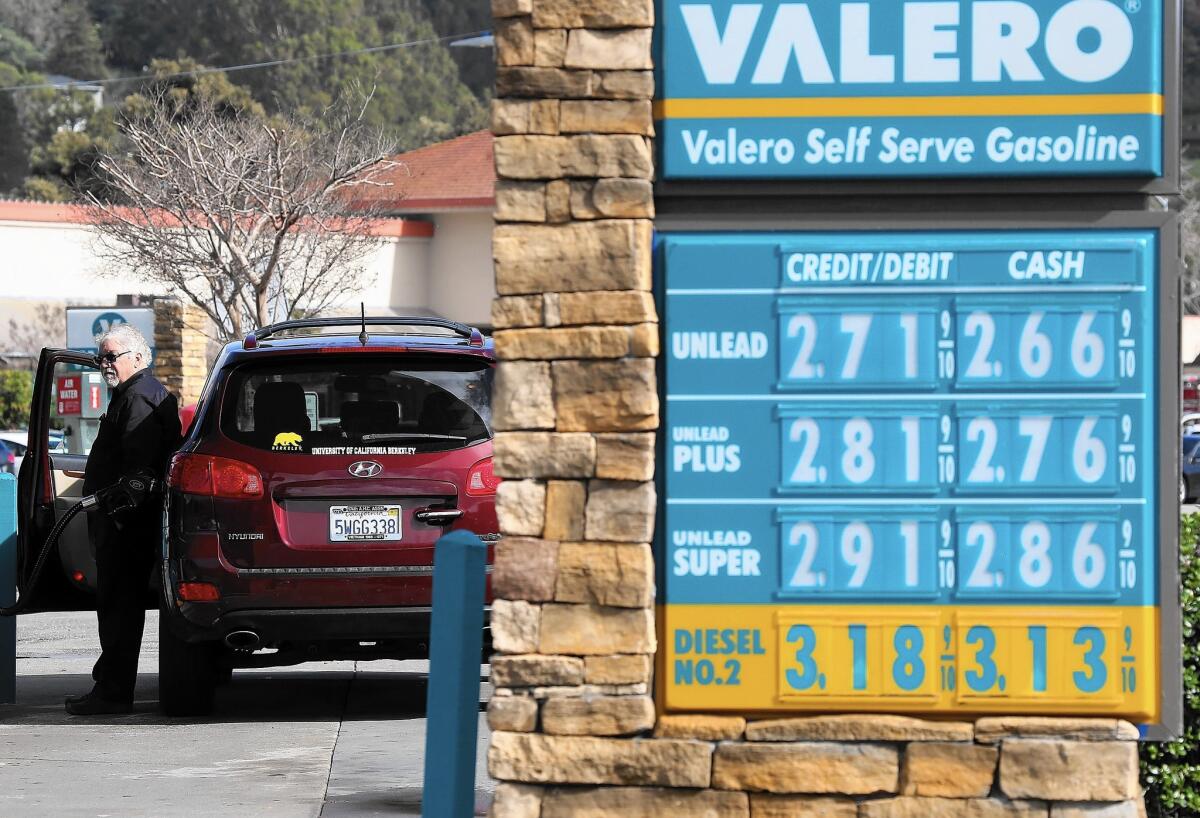Gas prices to drop to lowest in six years this summer, agency predicts

An ongoing glut of crude oil will give U.S. drivers this summer the lowest seasonal gasoline prices in six years, the government predicts.
Even in California — where prices recently surged a dollar above the national average, sparking accusations of collusion by oil refineries — analysts expect gasoline to be the cheapest it’s been in years.
Barring a natural disaster or other major supply disruptions, prices in the state will continue to fall, said analyst Allison Mac of the fuel-tracking firm GasBuddy.
“We may have already peaked in Los Angeles,” she said. “We’re on pace to have one of the lowest-priced summer driving seasons in a while.”
Nationally, between April and September — historically, the busiest driving season — gasoline will cost an average of $2.45 for a regular gallon at retail, according to a Tuesday forecast from the U.S. Energy Department.
The price, the lowest since 2009, is nearly a third less than the $3.59-a-gallon price during the same period a year earlier, according to the agency’s Energy Information Administration.
Travelers buoyed by a strengthening employment market and improving incomes will use 1.6% more gasoline this summer, according to the agency. But their fuel spending will be the lowest since 2004.
“It will cause people who are buying a new car to maybe change their minds about how fuel-efficient their vehicle has to be,” said David Hackett, president of transportation energy consulting firm Stillwater Associates in Irvine. “They’ll think, ‘I can buy myself an F-150 truck.’”
In large part, the decline reflects a supply that overwhelms demand. Last year, the U.S. was the top producer of petroleum in the world.
The surplus will cause the price of benchmark Brent crude oil to plunge 46% this summer to an average of $58 a barrel from $107 a barrel last summer, the energy agency predicts. In 2016, prices are expected to rise but only moderately.
Gasoline prices nationwide slumped for months after oil prices tanked last summer. They climbed slowly earlier this year and then reversed course last month. On Tuesday, an average gallon of regular gasoline cost $2.38 nationwide, down almost 8 cents from a month earlier and $1.20 less than the same day a year ago, according to GasBuddy.
If current negotiations result in oil-related sanctions against Iran being lifted, the government believes that prices could fall even further. Iran has at least 30 million barrels in storage and can quickly ramp up production, according to the energy agency.
Increased imports and domestic refinery production could also boost supply.
In California, a Martinez refinery idled by Tesoro Corp. in February in response to a nationwide worker strike is back online. Exxon Mobil Corp. said it is working to resume full production at its Torrance refinery, which was rocked by an explosion in its pollution-controlling equipment in February.
The two events pushed prices in California a dollar a gallon higher than in the rest of the country in February. Consumer advocates accused refineries of manipulating gasoline prices to pad their profits. State senators called an ultimately inconclusive joint committee hearing to discuss the allegations.
A combination of environmental regulations, a new cap-and-trade rule, taxes and fees keep retail gasoline prices in the state regularly 30 cents to 40 cents higher than the nationwide average. Before the refinery explosion and strike, California gas prices had followed the national trend of decreases.
The average $3.15 price in California as of Tuesday was 30 cents lower than a month ago and 89 cents cheaper than at the same time in 2014. In Los Angeles, the $3.19 price had fallen 34 cents from March and nearly a dollar from the prior-year date, according to GasBuddy.
Mac of GasBuddy estimates that the average gasoline price in Los Angeles could drop below $3 in early May and hover between $2.80 and $3.10 from May through August.
Prices along the West Coast are higher than in other regions of the country but are expected to follow the nationwide pattern by falling 28% from an average of $3.93 a gallon last summer to $2.82 a gallon this summer, according to the government.
Stillwater’s Hackett said the February price surge in California was mostly the result of “some market overreaction” to the Torrance refinery blast.
“Prices went up higher than I thought they would, but competition is bringing them back down,” he said. “If crude oil prices stay where they are, and there aren’t any more goofy refinery problems, retail prices in Southern California will continue to decline.”
Twitter: @tiffhsulatimes
More to Read
Inside the business of entertainment
The Wide Shot brings you news, analysis and insights on everything from streaming wars to production — and what it all means for the future.
You may occasionally receive promotional content from the Los Angeles Times.











